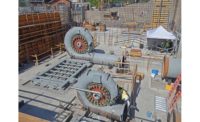“The LEC is an important piece of our energy supply portfolio going forward,” said John Roukema, director of electric utility at Silicon Valley Power, one of the LEC’s project partners. “The other key feature is the relatively low CO2 and greenhouse emissions, so it’s not just an addition to our energy supply portfolio, it also helps in our continuing movement toward a greener portfolio.”
Steve Hill, senior electrical engineer at the Modesto Irrigation District, said they will have a need for a base load resource as some of their long-term contracts soon come to an end. “LEC will be a wonderful base load source for us and it’s some of the most economical power you can get,” he said.
In addition, LEC will reduce volatility for its owners, decreasing the possibility of the brownouts and blackouts that took place in California a few years ago.
Naturally, having 14 participants involved in a project can create its own challenges.
“How you arrive at decisions with over a dozen different participants is a story in itself,” said Hill. “But so far it’s worked out well. Even though we all have our individual interests, if you look at the voting record you’ll see all the decisions are pretty much unanimous so far. That’s pretty remarkable.”
The permitting process was also a huge barrier to overcome, according to NCPA’s Warner. “By design it’s supposed to be 12-month process, but it took us about 18 months,” he said.
Project management of the huge endeavor has also been tricky. With 60 contracts in place to procure different supplies and materials, ensuring those supplies and materials arrive at the job site at the right time in order to meet the sequence of construction is challenging.
The LEC site is six miles west of the Lodi city center near Interstate 5. According to Speer, more than 150 jobs have been created as part of the LEC’s construction, with the majority of the construction workers coming from within a 50-mile radius of the project.
“The LEC has had a major impact on the local economy,” he said. “A lot of supply vendors and local contractors are coming in and helping, so the city of Lodi is also getting tax benefits.”
NCPA is also buying water from the city to cool the plant. The long-term water supply contract with Lodi will bring in a total of approximately $900,000 in revenue to the city.


Post a comment to this article
Report Abusive Comment